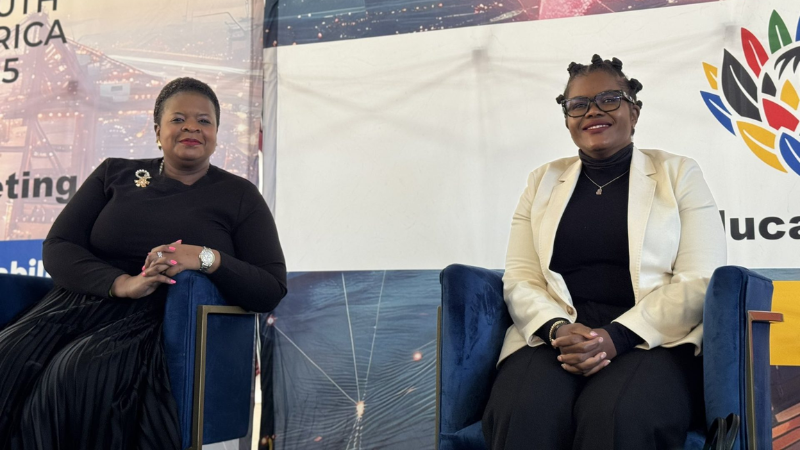
By Johnathan Paoli
South Africa’s Technical and Vocational Education and Training (TVET) system is crucial for inclusive development and its qualifications must be recognised globally, says Higher Education and Training Minister Nobuhle Nkabane.
“The TVET system is the backbone of inclusive development and we must align it to global standards and market needs. Recognition is no longer a choice, but a global necessity,” Nkabane told a G20 Education Working Group seminar on the mutual recognition of qualifications in a global context.
Earlier in the day, she visited the Orbit TVET College’s Mankwe Campus in the North West, where she spoke about the sector’s role in equipping young people with skills aligned to a rapidly evolving economy.
A key announcement came with a R13 million donation of advanced training equipment from China’s Yalong Intelligent Equipment Group.
This investment, which was secured during President Cyril Ramaphosa’s recent working visit to China, marks a milestone in public-private collaboration.
“This is not just a donation, but a legacy investment into the future of technical education in South Africa,” Nkabane said.
The equipment will be used to enhance practical instruction for artisans and lecturers, preparing students for global platforms like WorldSkills.
The minister also acknowledged Huawei’s continued support for digital skills development through its ICT Academies, calling on more international and local partners to invest in post-school education.
“Private sector innovation must walk hand-in-hand with education reform,” she urged, encouraging Sector Education and Training Authorities (SETAs) to expand industry collaboration.
Delegates toured the Mankwe campus to assess infrastructure needs and opportunities for development.
A student cultural showcase added a vibrant local flavour to the visit, reflecting the community-centred ethos of South Africa’s TVET institutions.
Later in the day, the G20 seminar on mutual recognition of qualifications brought together policymakers, researchers and education leaders from G20 nations, guest countries and global organisations at Sun City.
Nkabane positioned mutual recognition of qualifications as essential to academic mobility, labour migration and sustainable development.
Under the G20 Presidency’s theme of Solidarity, Equality and Sustainability, the seminar highlighted the importance of harmonising education systems across borders.
Nkabane outlined four key benefits of mutual recognition: improved academic and labour mobility, greater policy coherence, enhanced resilience and increased economic opportunity.
South Africa’s commitment to qualification mobility is reflected in its National Qualifications Framework, which supports formal, workplace-based, and prior learning.
The country is also an active participant in the Southern African Development Community Qualifications Framework and the African Continental Qualifications Framework. It has ratified both the Addis and Unesco global conventions on qualification recognition.
However, Nkabane acknowledged challenges such as misaligned qualification structures and regulatory systems.
She proposed innovation, particularly through micro-credentials, as a solution.
Commending the Potential of Micro-credentials in Southern Africa initiative, she argued for flexible, skills-based learning recognition to complement traditional pathways.
“Ultimately, recognising a qualification is about recognising a person. It’s about dignity, opportunity, and unlocking potential,” she said.
Higher Education and Training Deputy Minister Mimmy Gondwe further reinforced South Africa’s educational leadership during two key addresses at the seminar and a welcome reception.
Marking Africa Day, Gondwe emphasised the continent’s aspirations for unity and empowerment. She called on G20 stakeholders to ensure that education systems reflected the diversity and potential of African learners, particularly women and youth.
“Women must not only benefit from education—they must shape its future,” she said.
Gondwe also presented the G20 Education Working Group’s three thematic priorities: foundational learning, mutual qualification recognition and professional development for a changing world.
“These themes are not abstract. They are tools for rethinking education systems from the ground up,” she said.
Jako Olivier of the Commonwealth of Learning, who participated virtually, emphasised micro-credentials’ growing impact on youth employment and international skills portability.
He called for global interoperability and quality assurance, aligning with UNESCO and Commonwealth initiatives.
At the evening reception, delegates enjoyed South African cuisine and live cultural performances.
Gondwe encouraged guests to explore the North West province and deepen their connection to the country’s education and cultural landscapes.
Throughout the day’s proceedings, the role of the private sector and international cooperation was consistently praised.
By linking TVET revitalisation with international recognition frameworks, the country is positioning itself as a leader in skills development and cross-border mobility.
The ministry emphasised that with Africa’s voice amplified and global partnerships deepening, the G20 Education Working Group has taken a bold step toward a future where every learner’s journey is recognised and every skill counts.
Original article from Inside Education


